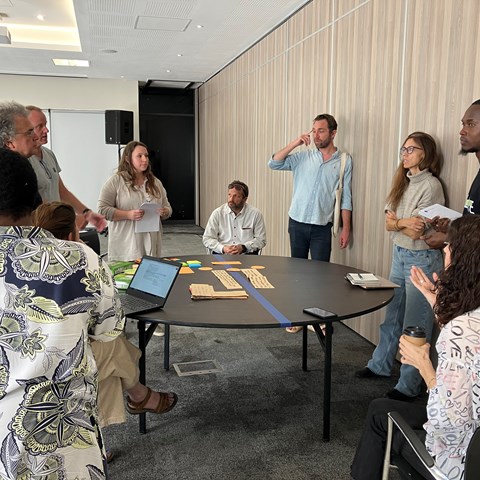Building innovation ecosystems for sustainable aquatic food systems: Insights from Cape Town Science-Policy Lab

From December 9-10, 2024, the SASi-SPi team organized a two-day Science-Policy Lab (S-POL) in Cape Town, South Africa, to engage diverse stakeholders in identifying policy options for sustainable aquatic food systems.
This lab focused on sustainable innovation ecosystems and completed a strategic series of three regional dialogues, the previous ones having explored other key dimensions of aquatic food systems transformation: resilience (Tanzania) and inclusion (Kenya).
The event brought together 44 participants from 11 countries across Africa and Europe, representing four key stakeholder groups within aquatic food systems: the private sector, academia, government, and civil society organizations. The gathering achieved gender balance, with 20 male and 24 female participants, ensuring diverse perspectives in the discussions.
Innovative research
The S-POL was preceded by a pre-engagement online session where participants explored critical trade-offs in achieving sustainable aquatic food systems. The day prior to the S-POL, participants visited the Marine Research Aquarium of the South African Department of Forestry, Fisheries and the Environment, where they learnt about innovative research on aquatic foods such as abalone, green algae, and sea urchins, along with integrated aquaculture technologies. This practical exposure provided concrete examples of innovation in action and facilitated informal networking.

Five key dimensions
A notable feature of the lab was its structured approach to exploring five key dimensions of innovation ecosystems: collaboration and networks, inclusivity and equity, capacity building and training, policy and governance support, and access to resources and funding. Through multiple interactive sessions, participants identified barriers and opportunities within each dimension, developed strategic actions, and explored potential synergies and trade-offs.
The lab's methodology involved participants working in balanced, multi-stakeholder groups that rotated through the five dimensions to ensure comprehensive coverage of all aspects. This approach fostered rich discussions and allowed diverse perspective to emerge on the challenges and solutions for innovation in aquatic food systems.
Through this comprehensive process, the SASi-SPi project aims to contribute to the transformation of aquatic food systems in Africa, ensuring they become more innovative, sustainable, and inclusive. The Cape Town Science-Policy Lab represents a significant step forward in bringing together diverse stakeholders to address complex challenges of food systems transformation.
Building on the outcomes of this lab, a final S-POL was organized in Brussels to synthesize the results from the three previous labs. This concluding event brought together insights from Cape Town, Kenya, and Tanzania to develop a cohesive and actionable framework for sustainably transforming aquatic food systems in Africa.